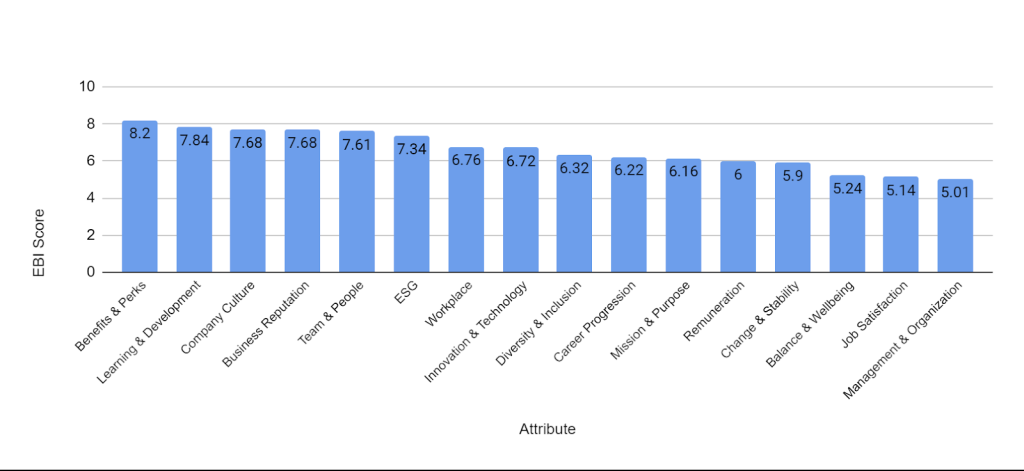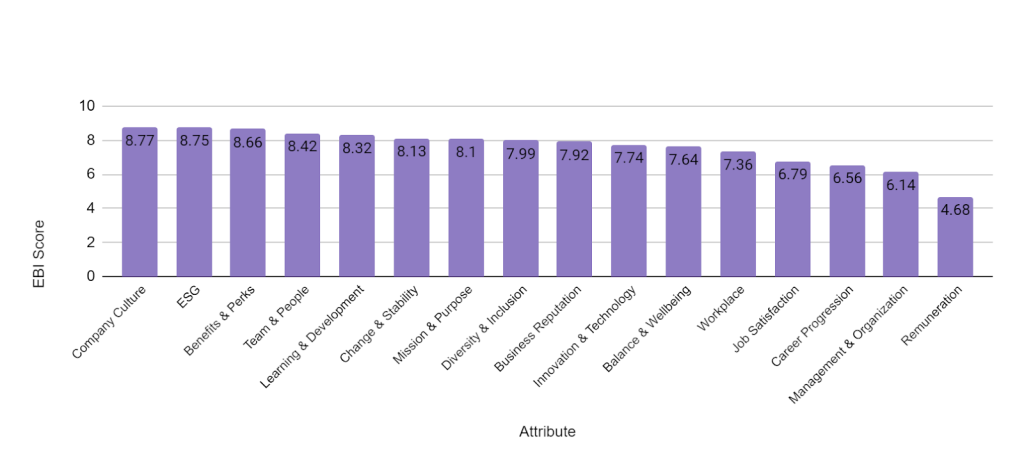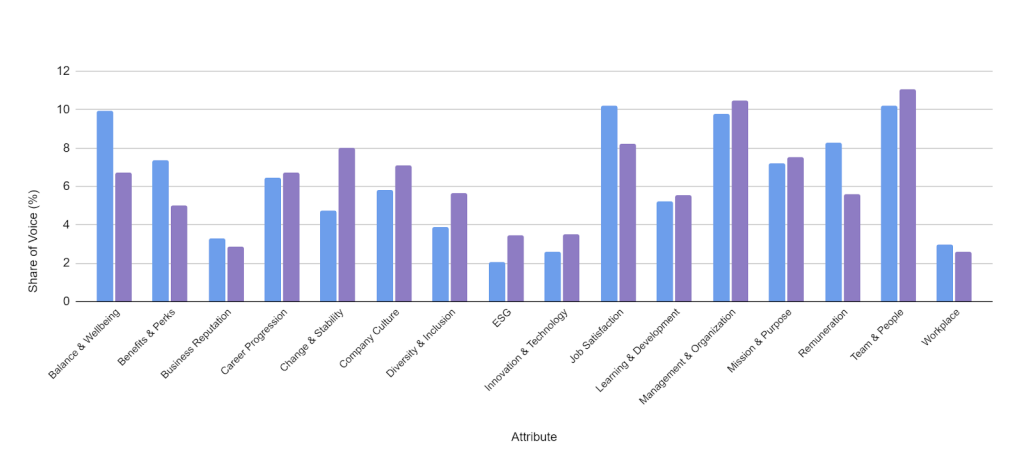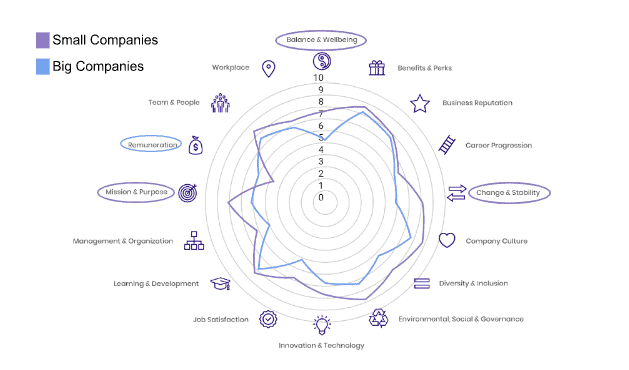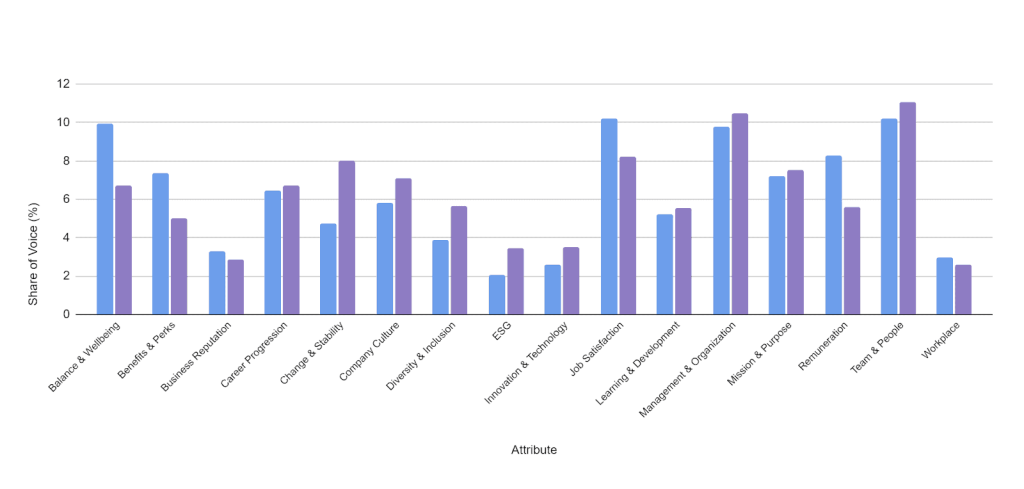
Employer branding, a company’s reputation as an employer, has become a vital factor in today’s highly competitive job market. Companies of all sizes, from industry giants to ambitious start-ups, are vying for the attention of top talent, and a strong employer brand can decide whether a candidate chooses to apply for a job or accept an offer.
At Link Humans, our analysts use the Employer Brand Index (EBI) to measure past, present, and future talent sentiment toward hundreds of diverse companies. As a result, our research has uncovered a surprising trend: renowned industry giants consistently exhibit a weaker employer brand than more obscure and less widely recognized companies.
This raises the question, why do well-known companies with significant resources and a well-established business reputation struggle to create and maintain a strong employer brand? To uncover the answer, our research article delves deeper into the underlying factors contributing to the weaker employer branding of big, well-known companies compared to smaller and lesser-known organizations.
Using our proprietary methodology, we will analyze qualitative data from over 100 publicly obtainable sources. This analysis will uncover the areas of a company’s employer brand that both big and small company talent are most positive and negative about and the reasons behind these perceptions. This research will provide valuable insights for companies, human resources professionals, and branding experts seeking to understand the complexities of employer branding and how to improve it within big and small organizations.
Methodology
We analyzed publicly obtainable data (including review sites, social media posts, and forums) from five big companies and five small companies, which we defined in the following way:
Big companies are globally successful and recognized companies, included in the top 20 of Forbes’ Global 2000 2022 list, and have over 150,000 employees. For these companies, we used data from Q2 and Q3 2022. Small companies were defined as those with less than 60,000 employees, which are either not included on the Forbes’ Global 2000, or are below #700 on the list. The time period for smaller companies was extended to an annual measurement from 2021 to 2022 to allow for a fairer comparison, as small companies naturally have lower data levels.
We conducted sentiment analysis on the data to calculate an EBI score for big and small companies on a scale of 0 to 10. In this article, we will first discuss the strengths and weaknesses of big and small companies before looking more closely at the significant differences between the two groups. Finally, we will make suggestions for why smaller companies appear to be scoring more highly.
Strengths and weaknesses of big companies
Across the five big companies we analyzed in this research, the highest-scoring attribute is Benefits & Perks. Talent spoke positively about perks available to them, such as free food, health insurance, gym memberships, generous PTO, and employee discounts. Learning & Development is also a high-scoring attribute within big companies. The commentary highlights the availability of extensive and interesting training programs (often including paid training), the opportunity to learn to work with new technologies, positive onboarding experiences, and abundant learning resources.
Another area in which big company talent is satisfied is Company Culture. A survey conducted by Comparably found that big tech companies were more likely to rank highly on workplace culture, with Microsoft, IBM, and Google being in the top three. Talent used words such as ‘friendly,’ ‘relaxed,’ ‘laid-back,’ and ‘employee-centric’ to describe the culture at their workplace. Business Reputation is also highlighted as a strength, with talent commenting that working for a globally recognized company can open doors for you later in your career.
The lowest-scoring attribute within big companies is Management & Organization. Bigger companies are more likely to have complex hierarchical structures when compared with small companies, which can lead to a lack of personal relationships and poor communication between leadership and lower seniority employees. Our analysis of the data revealed a consistent theme among big company talent of feeling unsupported by management, uninspired by leadership and frustrated by the inconsistency in management practices.
One attribute that scored surprisingly low for big companies is Change & Stability. In the past, the allure of working for a large company has been rooted in the perception of greater job security. However, recent developments have shown a shift in this trend, particularly in the Tech industry. With numerous job cuts and growing concerns among Tech talent about career stability, it’s clear that traditional notions of stability in large companies are being questioned. Our data analysis revealed several key themes related to Change & Stability; including high turnover rates, frequent organizational structure, and process shifts, and limited opportunities for new hires. Additionally, many Tech talents have noted that landing a job with a large tech company can be challenging, with highly selective hiring processes and few new hire opportunities in recent years. As a result, talented individuals may begin to explore the option of working for smaller companies that offer more accessible employment opportunities.
Finally, Job Satisfaction is an area of concern for big companies, with the most common criticism being that work tasks are repetitive and lack variety. However, it’s not just the nature of the work causing dissatisfaction. Big company talent also complains about heavy workloads and high amounts of pressure, reflected in the reasonably low Balance & Wellbeing score for big companies. Talent has reported feeling overworked, with regular weekend and long hour work schedules, demanding workloads, and a lack of support from the company when dealing with health or family issues. These factors indicate a lack of emphasis on work-life balance, making smaller companies more appealing to those looking for a better career balance.
Strengths and weaknesses of small companies
Our analysis of five small companies revealed the highest scoring attribute to be Company Culture. Small company talent said many positive things about their culture, using words such as inclusive, robust, employee-centric, open, and dynamic. The most commonly used adjectives to describe the culture were supportive and collaborative, which were mentioned in more than 20% of all positive commentary. This supportive culture extends beyond just the company culture as Team & People also scored highly, with the majority of positive feedback (over 30%) centered around the supportive nature of colleagues. This indicates that small companies tend to create supportive environments, not only in terms of their overall culture but also in terms of the relationships among colleagues.
Environmental, Social & Governance ranked second highest among the five small companies. A significant portion of positive commentary relevant to this attribute comprised social media posts celebrating sustainability and diversity awards. On the one hand, this type of positive commentary may not be generalizable to other small companies, as only a minority of companies are presented with these awards. On the other hand, small companies may be more likely to foster socially responsible environments. For example, smaller companies tend to have a flatter organizational structure, making implementing socially responsible policies and practices easier. Moreover, a strong sense of community within smaller companies may help create a shared values and purpose culture. This can make it easier for employees to align with socially responsible initiatives and for the company to establish a strong reputation for social responsibility.
Benefits and Perks scored third highest across the five small companies analyzed. While big company talent tended to focus on benefits that can be directly measured in monetary units (i.e., health insurance and employee discounts), small company talent gave significant praise towards fringe benefits. Most notably, small company talent commended the flexibility and freedom offered by remote working, with over 25% of all positive commentary for this attribute featuring words synonymous with flexibility.
Management & Organization ranked second to last among the small companies. A significant percentage of negative feedback, over 25%, was related to internal bureaucracy and workplace politics. These comments were similar to those made by employees of larger companies. However, comments about poor and unsupportive management were noticeably absent. This suggests that small companies have different management and organizational challenges than larger ones, which may require different solutions.
Career Progression attained the third-lowest score across the five small companies. Many small company employees complained about the lack of opportunities for career growth, with words such as “slow” and “limited” frequently used in conjunction with “career growth” in close to 40% of all negative feedback on this attribute. This data suggests that small companies may struggle to provide the same career growth opportunities as larger companies. One reason could be the limited number of positions available for employees to move up and fewer resources to invest in employee development programs. Additionally, smaller companies may not have the same level of visibility or prestige as larger companies, making it more difficult for employees to gain recognition and advance within their industry.
Differences between big and small companies
Our research included an analysis of ten companies, of which five were big companies and five were small companies. The results revealed a striking difference in the average EBI score, with big companies scoring an average of 6.42, while small companies scored significantly higher, with an EBI score of 7.57. A comparison of big and small companies for each attribute is provided in the chart below. In the next section, we will delve deeper into the findings and focus on the three attributes in which small companies performed notably better than big companies and one area in which big companies achieved a superior score.
Balance & Wellbeing
A significant score difference was observed between big and small companies for Balance & Wellbeing. Talent at both big and small companies alike complain about long working hours, work-related stress, and demanding work tasks. However, while these factors lead to poor work-life balance for employees at big companies, they do not have the same impact on employees at small companies. Despite having high workloads and long working hours similar to those at big companies, employees at small companies have more flexibility in their schedules and the ability to work from home. These options provide a sense of autonomy, allowing employees at small companies to create a work-life balance that suits them.
While talent at big companies also frequently discussed hybrid working options and flexibility, many larger companies have recently changed their work-from-home policies. The data from several companies we analyzed highlighted recent ‘return to office’ policies in big tech companies, which most talent appears to be unhappy with.
Change & Stability
Our research found a significant difference in scores for Change & Stability between talent from big and small companies. Specifically, talent from big companies reported feeling insecure in their positions, whereas employees from small companies described their work as stable and secure. Additionally, employees from small companies were found to be more active on LinkedIn, with 70% of comments related to this attribute being celebratory posts about new job positions and work anniversaries. In contrast, only 30% of comments from big company talent related to this attribute were celebratory posts on LinkedIn.
This disparity can be attributed to the significant job cuts and hiring freezes implemented by several big companies analyzed in this research. These actions have likely contributed to the increased sense of insecurity felt by big companies’ talent and decreased activity on LinkedIn. It is also worth noting that the presence of internal communications channels and regulations at big companies may also play a role in the observed difference in LinkedIn activity.
Mission & Purpose
Another score difference that was observed was for the Mission & Purpose attribute. Our analysis found that employees at big companies often reported feeling disconnected from the company’s core mission. They commented that the company’s sheer size made it difficult for them to see how their work contributed to the company’s overall goals, leading to feelings of insignificance and a lack of connection to its values.
On the other hand, employees at small companies reported a strong sense of alignment with their core values and mission. They noted that adherence to these values was actively promoted throughout the organization, regardless of an employee’s seniority or job role. This close alignment with the company’s mission and values fostered a sense of purpose and engagement among small company talent. Furthermore, the tight-knit and collaborative culture of small companies described previously may also lead to employees feeling more connected to the company’s values and mission.
Remuneration
An area in which big companies outperformed smaller companies is Remuneration, with big companies attaining a score of 6.00, compared to 4.68 for small companies. Talent from big companies spoke positively about the competitive starting salaries, stock options, and yearly bonus/salary raises offered by these companies.
Remuneration was the lowest-scoring attribute across the five small companies we analyzed. Talent frequently complained about base salaries below industry standards, with some indicating that their company could not match the compensation provided by big company counterparts.
Share of Voice
At Link Humans, we use the term ‘share of voice’ to describe a metric that captures the relative importance of a single attribute among all the attributes being commented on. It is calculated by taking the number of comments for a single attribute, dividing it by the total number of comments for all attributes, and expressing the result as a percentage. This clearly represents how much attention a particular attribute receives in relation to all the others.
Our analysis revealed notable variations in the share of voice between big and small companies and differences in attribute scores. Specifically, we found that small companies had a considerably higher share of voice for Change & Stability, likely due to employees being more active on professional networking platforms like LinkedIn. In contrast, big companies had a substantially higher share of voice for Remuneration and Benefits & Perks, indicating that employees at these companies place a greater emphasis on compensation packages and view it as a more critical aspect of their job. This suggests that the priorities and values of employees at big and small companies may differ regarding specific attributes.
It is also worth noting that big companies tend to have higher levels of negative commentary from passive candidates on social media, particularly when they have recently introduced controversial work policies (such as return to office), or have been featured in the news regarding upcoming job cuts. On the other hand, small companies are less likely to be discussed in the media. Their commentary primarily comes from current or former employees, which may be another reason they score more highly on average.
Conclusion
In conclusion, this research article has delved into the differences in EBI scores between big and small companies. It has examined the areas in which talent from these companies is satisfied or dissatisfied. It is clear that both big and small companies possess distinct strengths and weaknesses and that there are observable variations between the two. It would be beneficial for larger companies to take note of the areas in which smaller companies outperform them to mitigate the risk of talent attrition. For instance, big companies could focus on improving work-life balance and providing more flexibility in the workplace. However, small companies should also be aware that negative sentiment towards Remuneration may lead to talented employees leaving to work for bigger employers, particularly during times of economic hardship. Talent may be drawn to bigger or smaller companies for different reasons, and there are several explanations for why smaller companies have been performing more highly in employer branding recently. While it is impossible to clearly state whether it is ‘better’ to work for a big or small company, both types of companies can learn from each other’s strengths and weaknesses to promote employee satisfaction and boost talent retention.
By Lauren Arthur & Matthew Sefton, Data Analysts at Link Humans. Learn more about what the Employer Brand Index can do for your organization’s reputation as an employer.
- Tagged With:
- Comparison
- Ebi
- Matthew Sefton
- Research
STAY CONNECTED.
DATA-DRIVEN EMPLOYER
BRAND INSIGHTS.
Our newsletter is exclusively curated by our CEO, Jörgen Sundberg, for leaders who make decisions about talent. Subscribe for updates on The Employer Branding Podcast, new articles, eBooks, research and events we’re working on.

